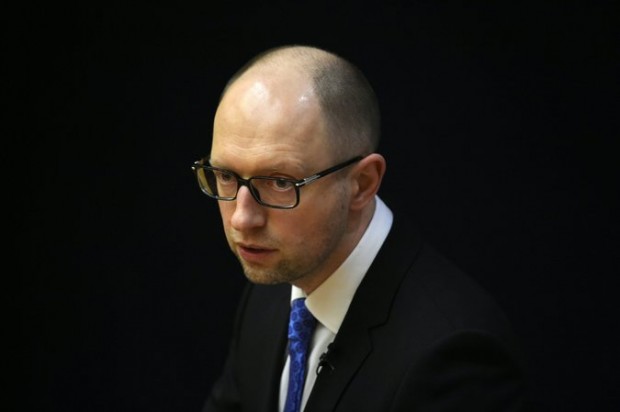Ukrainian PM to resign after Panama papers scandal

Arseniy P. Yatsenyuk, the prime minister of Ukraine, announced his resignation on Sunday in a surprise move that opened a new period of political uncertainty here.
Mr. Yatsenyuk, an economist backed by Ukraine’s Western allies, including the United States, came to power two years ago behind the wave of popular anger that culminated with the Maidan street protests, which led to the downfall of President Viktor F. Yanukovych. Mr. Yatsenyuk and Petro O. Poroshenko, who became president, emerged as the nation’s most prominent political figures.
But the revolution’s leaders soon turned on each other. Although authority is supposed to be balanced evenly between the president and the prime minister, Ukraine’s Western allies eventually sided with Mr. Poroshenko and pushed Mr. Yatsenyuk to step aside.
In recent months, both men had been resisting compromises on appointments and were reportedly thwarting corruption investigations into allies, threatening Western aid.
In a video released to television stations on Sunday, Mr. Yatsenyuk signaled that he would try to smooth over the cracks in the post-Maidan alliance. He said he would support as a candidate for prime minister Volodymyr B. Groysman, a member of Mr. Poroshenko’s political party and the current speaker of the Parliament, and would keep his party in the coalition after leaving office.
“We cannot allow destabilization of the executive branch during a war,” he said. “The desire to change one person has blinded politicians and paralyzed their will to bring about real changes in the country.”
Slender, cerebral and nicknamed “The Rabbit,” Mr. Yatsenyuk had become emblematic of Ukraine’s impasse after the heady days of the pro-European street movement.
He emerged as a popular figure, but his support largely evaporated because of various scandals and missteps. A political ally, for example, was forced to resign from Parliament after it emerged that he was under investigation for money laundering in Switzerland.
Mr. Yatsenyuk confronted tremendous challenges as prime minister, not least because of the Russian annexation of Crimea and military intervention in the east during his tenure. Ukraine’s morass of financial problems required a $40 billion international bailout package.
In tackling them, he faced deep suspicions from the public, and from political opponents and allies alike, that he had fallen back on traditions of negotiating back-room deals with Ukraine’s post-Soviet business elite, the oligarchs.
“He couldn’t abandon the former practice of consulting the oligarchs before making decisions,” Yuri V. Lutsenko, the head of the president’s faction in Parliament, said in a telephone interview on Sunday.
Mr. Poroshenko, a chocolate and confectionary magnate whose offshore accounts surfaced in the leak of legal documents known as the Panama Papers, has also faced criticism of mixing business and politics, a longtime bane of Ukraine.
Before Mr. Yatsenyuk’s appointment as prime minister in 2014, a leaked recording of a telephone conversation between Victoria J. Nuland, a United States assistant secretary of state, and the American ambassador in Ukraine, Geoffrey R. Pyatt, seemed to underscore the West’s support for his candidacy. “Yats is the guy,” Ms. Nuland had said.
By this year, the West’s support had begun to wane. Christine Lagarde, the managing director of the International Monetary Fund, which props upUkraine financially, said progress had been so slow in fighting corruption that “it’s hard to see how the I.M.F.-supported program can continue.”
Five ministers will also resign in a cabinet shuffle, but the governing, pro-Western parties resisted calls for new elections that polls indicate could usher in pro-Russian politicians in eastern Ukraine.
“Objectively, it is ridiculous to claim responsibility remains only with Yatsenyuk for the bad state of the economy and ongoing corruption,” Oleh Voloshyn, a consultant for the Opposition Bloc political party, which represents Russian speakers in Ukraine’s southeast, said in an interview. “The best solution is the cleansing process of an election. Let the people decide.”
In this reshuffle of the post-revolution leadership, the powerful position of prosecutor general remains unfilled.
Mr. Lutsenko, who formerly held the top law enforcement position in Ukraine as minister of interior, before being sentenced to prison on political charges after a previous change of government here in 2010, confirmed that he had discussed with the president taking the post.
Having been a police officer and a prisoner, Mr. Lutsenko said, qualified him to oversee prosecutions. “I saw both sides of the coin,” he said.
How to submit an Op-Ed: Libyan Express accepts opinion articles on a wide range of topics. Submissions may be sent to oped@libyanexpress.com. Please include ‘Op-Ed’ in the subject line.
- Libya’s HCS invites applicants for key state roles - December 31, 2023
- UK calls on Iran to prevent escalation in Israel-Hamas conflict - November 05, 2023
- Libyan Interior Minister: Immigrant shelter costs a fortune - November 05, 2023


